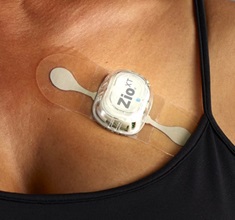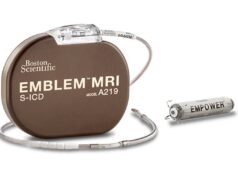
Screening for atrial fibrillation (AF) using a wearable heart monitor for two weeks can identify older adults with this potentially dangerous abnormal heart rhythm, but does not prevent subsequent strokes, according to late-breaking research presented recently at the European Society of Cardiology (ESC) congress (30 August–2 September, London, UK).
The authors of the study in question have also noted that, because the trial was terminated early due to the COVID-19 pandemic, their results cannot provide a definitive answer regarding the ultimate benefit of AF screening to reduce hospitalisation rates for stroke.
“Our study showed a 52% increase in the number of cases of AF diagnosed over a maximum of 2.5 years of follow-up, an increase in the initiation of oral anticoagulants with no increase in rates of hospitalisation for bleeding, and no significant reduction in the rate of hospitalisations for all stroke compared with usual care,” said Renato Lopes (Duke University Medical Center, Durham, USA), the study’s lead author.
“Despite being the largest study using a 14-day, patch-based continuous ECG [electrocardiography] monitor as the screening strategy, our results should not be considered conclusive due to the early termination of the study and lower-than-expected number of clinical events. Further studies with longer follow-up and including participants at higher risk for stroke are needed to establish the true potential of AF screening in reducing rates of strokes.”
Given that cardiovascular diseases (CVDs)—mainly heart attack and stroke—remain Europe and also the world’s leading cause of death, the ESC is calling for CVD and diabetes screening to be part of national and European Union health plans, in an effort to prevent CVD and improve education of cardiovascular health at a population level.
AF is the most common heart rhythm disorder, yet many people do not experience any symptoms and the condition often remains undiagnosed, as stated in a recent ESC press release. In addition, the fact that AF can be intermittent (paroxysmal) exacerbates the challenge of identifying those who have it. Individuals with AF face a five-fold increase in the risk of stroke and are therefore often prescribed anticoagulants to prevent blood clotting.
Recent trials have shown that one-time, brief screening for AF did not significantly increase diagnoses of the condition—while others investigating longer-term screening found an increase in AF diagnoses, primarily relating to paroxysmal AF. However, to date, none have established that AF screening lowers stroke rates.
Having been started in December 2019, the GUARD-AF trial randomised 11,905 patients from 149 primary care sites across the USA to examine whether AF screening using a continuous ECG patch monitor (Zio XT [iRhythm Technologies]) that records heart rhythm for 14 days could identify older adults with undiagnosed AF, resulting in a reduced rate of any stroke compared with usual care. In total, 5,952 participants (median age, 75 years; 57% female) were randomised to screening and 5,953 to usual care. Of those randomised to screening, 5,684 (96%) returned ECG monitors with analysable results. Researchers examined Medicare claims and Kaiser Permanente data to determine clinical outcomes.
Across a median follow-up of 15 months, the number of patients with a stroke in the screening group was numerically higher than in the usual care group (37 vs 34), while the number of patients with a bleeding event was numerically lower in the screening group compared to usual care (52 vs 60). In addition, both AF diagnoses and treatments with oral anticoagulant therapy were more frequent in the screening group compared to the usual care group (5% vs 3.3%, and 4.2% vs 2.8%, respectively).
“Our results add to the body of evidence around AF screening and highlight the challenges in determining the impact of AF screening on clinical outcomes,” Lopes noted. “Until we have clear information on who should be screened, how, and for how long—and its real impact in stroke prevention—AF screening should not be routinely recommended.”









